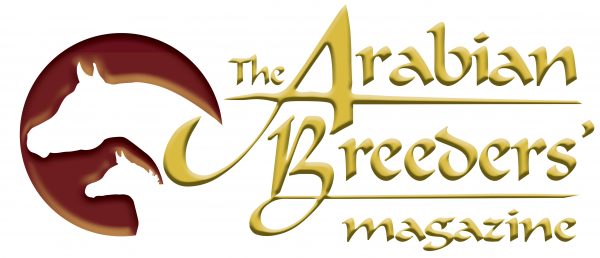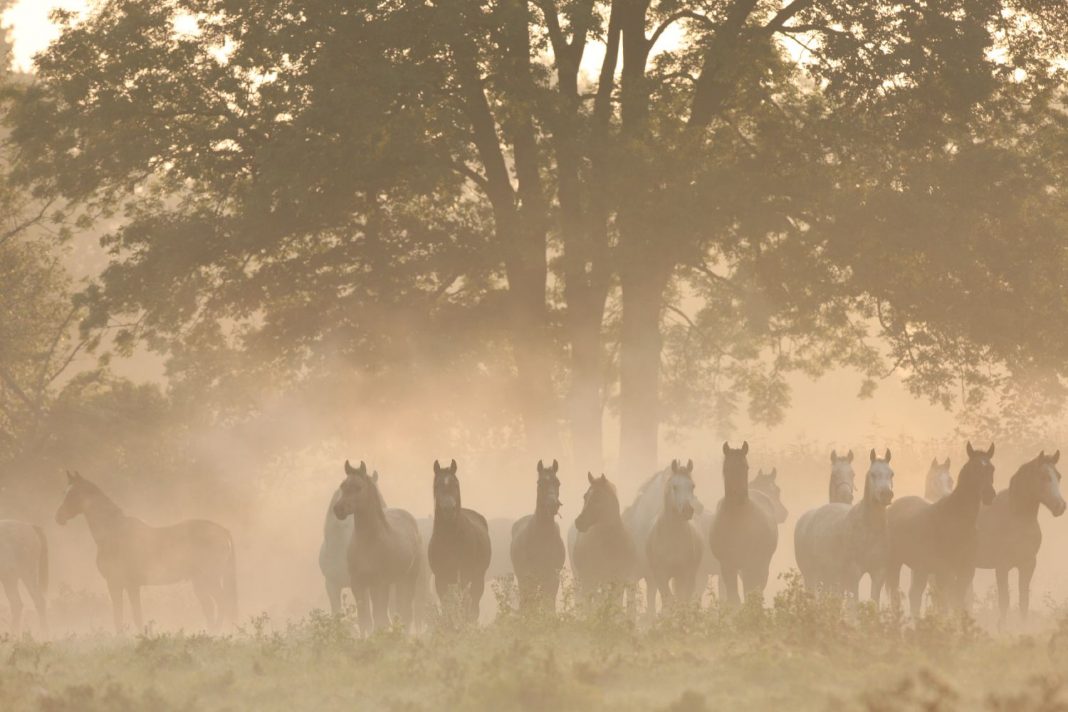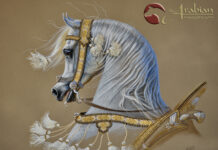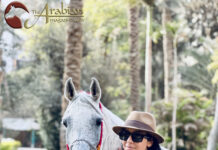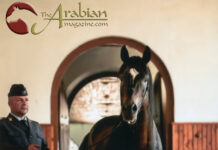The Breeders Interview – Ismer Stud, Germany
In every edition of The Arabian Breeders’ Magazine, we speak to a selection of breeders from around the world about their experiences and successes with their breeding programme. We are delighted to share some of these incredibly insightful features online.
The Arabian Breeders’ Magazine (TABM): Please share with our readers a short background of your farm.
Nils Ismer, Ismer Stud, Germany: Ismer Stud was founded in 1959 by my grandfather, Rolf Ismer, who bought his first pure-bred Arabians to improve the pony breed on the farm that has been owned since the 13th century by our family. After then, he started to breed pure-bred Arabians with passion. He handed over the stud farm to my father, Holger Ismer, who is still a well recognised ECAHO judge, and he ran the farm until 2007. He increased the breed a lot by adding bloodlines from the Polish State Studs as well as Egyptian blood from breeding programmes, such as those of Dr Hans Nagel. His biggest breeding success was the combination of Madkour I (Hadban Enzahi x MohebaII) with Shiwa (Ghazal x Shari I). This breeding produced five foals, of which Mashour twice became Reserve World Champion, Mashoura was twice Reserve European Champion, and Madoura, who was also a Reserve European Champion. Besides that, he found numerous successful horses and promoted them all over the world. Since 2007, my wife Julia and I run the farm and the zoo, which today has around 180 pure-bred Arabian horses and 700 exotic animals from all over the world.
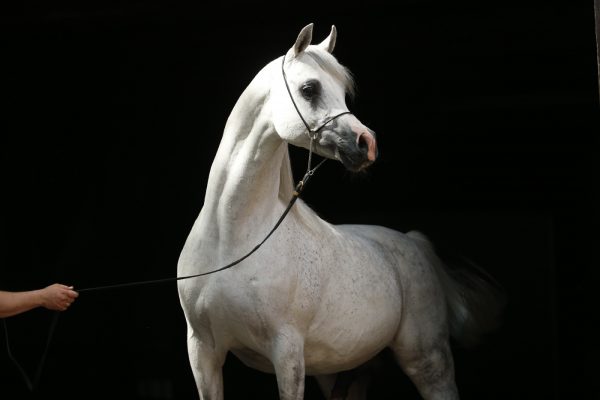
Altis (WH Justice x Albia), Chief Sire at Ismer Stud. Credit Ismer archives.
TABM: What have been the bloodlines that you have focused on, and why did you choose them? Has this focus changed over the years?
Nils: As I mentioned before, our breeding programme is built on old German lines in combination with Polish and Egyptian blood. Our breeding aim is a healthy and correct horse with a kind and brave character, sparkled by a heart-catching type, expression and flying movement. We believe that the combination of the above mentioned genes is the perfect base to achieve our goals. Within the past years, Arabian type has become probably more important due to the development of the show industry. Nevertheless, we will keep searching for our principles in each horse. The idea of crossing Polish or Russian bloodlines – that are actually also more or less Polish – with Egyptian blood was always successful and can be found in the most successful show horses in the present time.
TABM: What were your breeding goals when you first started? Have they changed over the years?
Nils: My breeding aims have not changed through the years. Probably beauty and extreme faces have become more important for the market than they were 25 years ago.
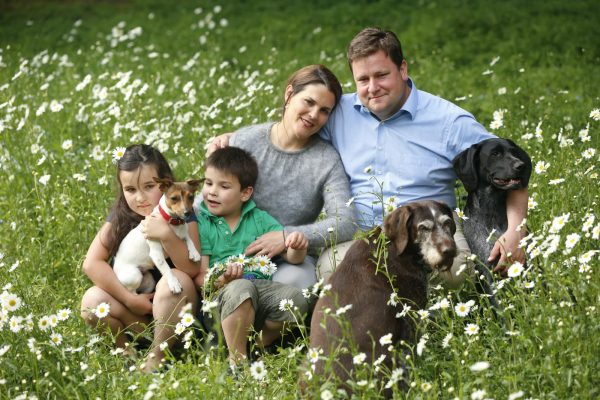
Nils with his wife, Julia, their children Lina and Noah, and their dogs at home at Ismer Stud. Credit Ismer archives.
TABM: Please share key moments that stand out in the early stages of your breeding programme?
Nils: Talking about our breeding programme, I need to talk about my father’s and grandfather’s work. My grandfather found Shari I (Hadban Enzahi x Haita), mentioned earlier, and Madkour I. The success of both was dominating German Arabian horse breeding in the 1980s and both horses can be also found in the pedigree of IS Exxpu (QR Marc x IS Exelsia), who was just named Reserve European Champion Stallion in Belgium. My father bred horses such as Sehnab (Jamil x Sabah), Siam (Madkour I x Sehnab), Sinus (Salaa El Dine x Senaja) as well as the previously mentioned Mashour, Mashoura, and Madoura. He imported stallions including Pasat (Gwarny x Parma), Eunizar (El Azrak x Eunice), Festiwal (Palas x Fatima) and many more. These stallions are still the foundation of our horses today.
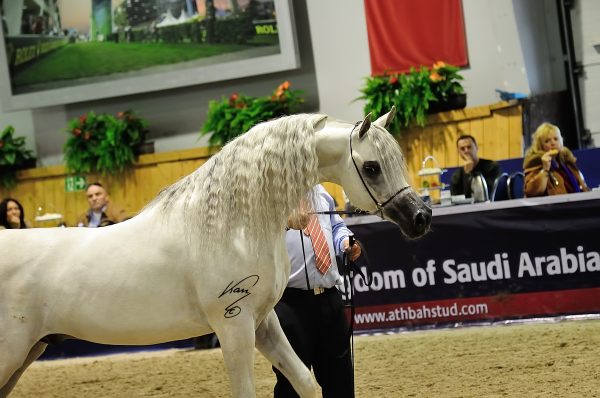
Palmaton K (El Nabila B x Pocahontas K), Chief Sire at Ismer Stud and bred by Murillo Kammer from Brazil. Credit Jan Kan.
TABM: When was it that you realised that you were a successful breeder? And what, in your opinion, defines a ‘breeder’?
Nils: The success of our breeding programme is the continuous success through three generations. One lucky shot does not make you a successful breeder. I would not declare myself as a successful breeder, but I am proud to be responsible for a successful breeding programme. If other people have the opinion that my work was successful at the end of my life, than, maybe, I was a successful breeder.
To be a breeder means to have a dream. To be strong enough to follow your dream all the way until you make it come true. This includes a lot of fantasy, strength and passion. If your life is guided by these values, you are a breeder, and it doesn’t matter if you have one mare or one hundred.
TABM: As a breeder, how do you feel about the showing world? Do you think that changes are needed to celebrate breeders more?
Nils: The show business has developed very quickly in a professional way, especially within the past ten years. Huge events have become more and more professional and entertaining. Spectacular shows such as Aachen, Paris, Dubai or Las Vegas are fascinating people all over the world, and can be seen on any mobile phone wherever you are. Prize money has become a serious income source for professional breeders. However, during this development, we probably forgot about some important values. The whole industry recognised that the new developments did not really help or encourage the normal breeders to be a part of it. Luckily, by now, there are new ideas coming up such as breeders’ shows and amateur competitions, and these are going in the right direction, but for my opinion, we still need to do more. In Paris, you will find the first announcements of a new project for the European breeders, the European Breeders Trust, and this will help the members to be successful in this business. You can be already excited!
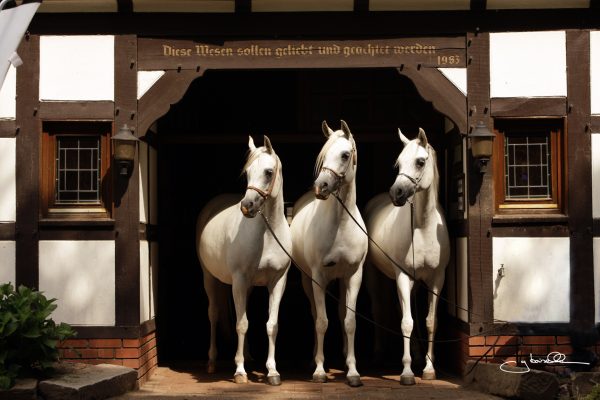
The classic Ismer Stud photograph(l-r)COLON IS Excelsia (Madkours Impuls x Exquita), IS Sheyka (Madkours Impuls x Shewala) and Fatma (Pasat x Fasetta). Credit Gabrielle Boiselle.
TABM: Do you think that breeders are a dying breed, pardon the pun?
Nils: Not really dying, but for sure endangered! But there are also many examples of private breeders that are still very successful in the job. Still, we all know that we should really care about this species as it is the foundation of the whole Arabian horse breed. The small breeders guarantee not only the longevity of the breed, but – even more important – the diversity of bloodlines and breeding strains! The Arabian horse is much more than just a show horse. We definitely need the passion and power of people who dedicate their lives to the Arabian horse!
TABM: Do you think that breeders and dedicated breeding programmes still have a place in the world today?
Nils: If we lose our dedication, we will lose the fascination of these wonderful creatures. Than it will become an industry without emotions and fun. That would be the moment for me to stop.
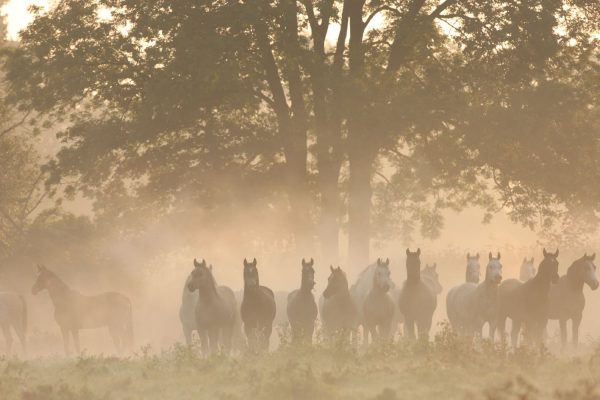
Mares at Ismer Stu. Credit Ismer archives.
TABM: Over the years, what have been your key successes, perhaps the ones that define your farm?
Nils: Stamina, passion, sense for beauty and fantasy!
TABM: And finally, what is next for you and your breeding programme?
Nils: My biggest aim is to improve our breed year by year. I want to be proud of any single horse in our stable! This is a long road, it is not a position to reach, so probably like any other breeder, I will never have the feeling, that I have achieved all my aims. One thing is probably on the to-do list: Aachen Gold Champion with a homebred horse!
The future is a challenge for all of us, maybe more than some people believe today, and I honestly hope that there will always be people with passion, integrity and dedication in the business. As long as this is the fact, we are on the right path!
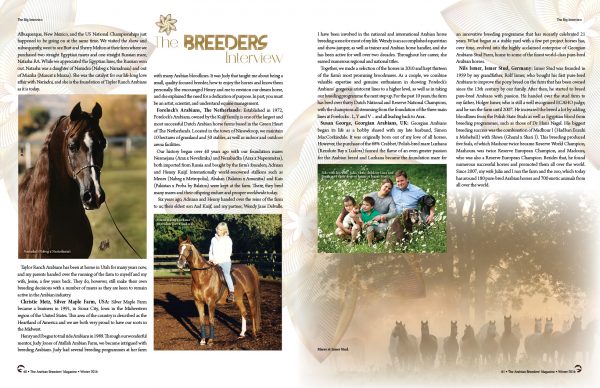
First printed in The Arabian Breeders’ Magazine Volume I Issue II December 2016. To enjoy further content such as this, please visit The Arabian Magazine Shop.
